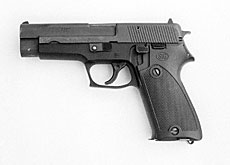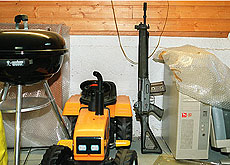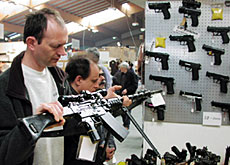High gun suicide rate linked to easy access

Tighter gun laws would lead to fewer suicides involving firearms in Switzerland, according to a study by Zurich University researchers.
Every day, one person kills himself or herself with a gun, more often than not a military weapon – a fact the authors say is directly connected to lax Swiss firearms legislation.
According to the study, published in the current edition of the American Journal of Public Health, Switzerland and the United States have the highest rates in the world of suicide involving guns.
Suicides are also five times more common than the total number of deaths related to car accidents, drug abuse and Aids.
The authors claim the easy availability of weapons – there are an estimated two million firearms in circulation in Switzerland – increases the risk of impulse suicides and murder since suicides result mainly from decisions taken in the heat of the moment.
Switzerland has an arms tradition going back hundreds of years and soldiers of the country’s militia army are allowed to keep their weapons at home. There are also more than 150,000 active members of rifle clubs.
The interdisciplinary study led by the Psychiatric University Hospital in Zurich established a connection between the availability of weapons and gun suicide rates.
The findings were backed up by psychiatrist Andreas Frei from Lucerne cantonal hospital, who has also researched the subject.
“There is a clear link between the number of guns in a country and the number of murders or suicides; this has been shown in several international studies, especially those led by Swiss criminologist Martin Killias,” Frei told swissinfo.
Liberal
Switzerland and the United States – which both have liberal laws on the possession of firearms – report the highest suicide rates involving guns. In countries with tighter restrictions on gun possession, the suicide rate involving guns was lower.
The researchers pointed to Canada and Australia, which at the end of the 1980s limited the availability of guns in private households and saw the gun suicide rates decrease correspondingly.
Canada, for example, lowered the availability of guns from 31 per cent to 19 per cent and the suicide rate involving guns dropped from 32 per cent to 19 per cent.
In Australia, the number of households with guns was halved from 20 to ten per cent and the number of gun suicides fell from 30 to 19 per cent.
In Switzerland, however, the number of suicides involving guns increased over the same period from 23 to 27 per cent. The researchers are therefore calling for tighter regulations.
Measures
“Just as with the availability of potentially fatal medication, chemicals or machinery, there is a need for restricted access to guns,” said Vladeta Ajdacic-Gross, the study leader.
He said that there was a range of available measures such as a weapons register, bans on specific weapons, need and aptitude tests, interviews with applicants and having to wait for a certain period before one can buy a weapon.
Frei added: “One other way of reducing the number of suicides would be to prevent people from storing ammunition at home.”
In a separate development on Tuesday, in response to a motion put forward by the Green Party in May, the government announced that Swiss soldiers may continue to keep their weapons at home during and after military service.
It added that current preventive measures, whereby a soldier could have his weapon taken away if there was proof that he might harm himself or others, were adequate.

More
Militia army
Debate on the use of firearms was fuelled in April when the husband of a former women’s ski champion, Corinne Rey Bellet, killed his wife and her brother with his army pistol.
The Senate – the chamber that represents Switzerland’s cantons – came out in favour of slightly stricter rules for purchasing and keeping firearms in June but a significant tightening of the law was not on the table.
It decided by 24 votes to eight against a central database.
Amnesty International believes that the availability of guns should be restricted, arguing that the fact they are kept in the home is a permanent risk and could be a contributing factor for suicides and murders.
There are about two million firearms in circulation in Switzerland.
The number of suicides is close to 1,500 a year. Suicide accounts for more deaths than car accidents, drugs and Aids together.
Among those demanding tighter laws are Amnesty International, the Swiss Peace Council, the Victims of Violence Forum, the Stop Suicide Association, Ipsilon (the Initiative for the Prevention of Suicide in Switzerland) and the Swiss Society of Psychiatry and Psychotherapy.

In compliance with the JTI standards
More: SWI swissinfo.ch certified by the Journalism Trust Initiative



You can find an overview of ongoing debates with our journalists here. Please join us!
If you want to start a conversation about a topic raised in this article or want to report factual errors, email us at english@swissinfo.ch.